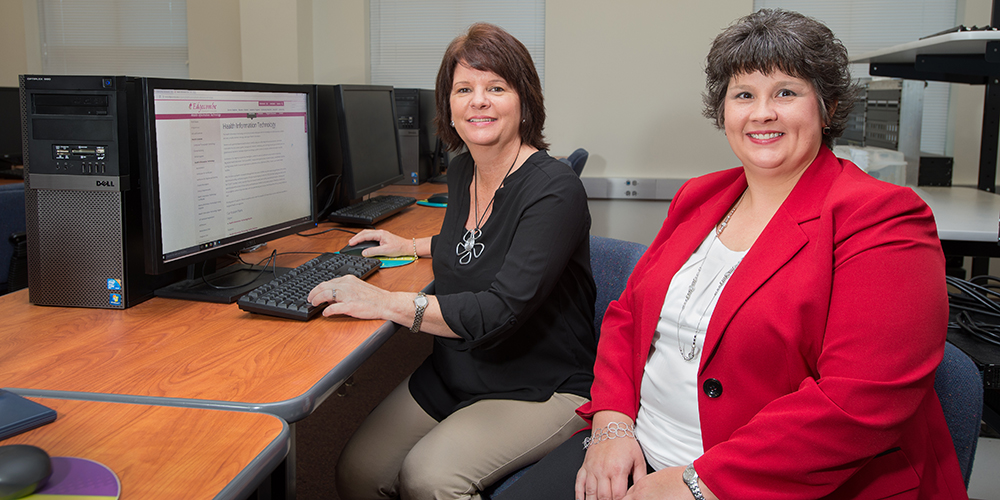Online Instruction Growing at ECC

In December, Elizabeth Stone (left) completed a degree in Health Information Technology, which is an online program at Edgecombe Community College. She says that being a successful online student requires organization and self-motivation. Shown with her is Nacole Everette, HIT program chair and instructor.
Reflecting a national trend, student enrollment in online classes at Edgecombe Community College is on the rise.
Over the past three years, the number of students enrolled in online classes has increased 14 percent, from 1,206 students in Fall 2014 to 1,374 students in Fall 2016.
“Online classes are more convenient, and they are less expensive in some ways because students don’t have to worry about transportation to class,” says Arnold Worsley, distance learning administrator at Edgecombe Community College.
Nationwide, online classes have continued to increase at two-year institutions even though total enrollments have largely stabilized or decreased, according to the American Association of Community Colleges.
To accommodate the growth in the demand for online options, Edgecombe Community College has added numerous classes to its online offerings in recent years.
The number of courses both fully online and partially online increased 20 percent from 372 in Fall 2014 to 448 in Fall 2015, according to Worsley. Course offerings leveled out in Fall 2016, which saw 437 courses.
The college offers six programs in which students can earn a two-year degree entirely online: Accounting, Business Administration, Geospatial Technology, Health Information Technology, and two College Transfer programs, Associate in Arts and Associate in Science.
In addition, the Lateral Entry Teaching Certificate can be earned online.
Most of ECC’s online students live in North Carolina, but a few live out of state. In some cases, Edgecombe Community College’s out-of-state tuition is less expensive for students who live in areas with a high cost of living.
Worsley says online classes can be challenging since instructors and students have no face-to-face interaction. Online classes are best suited for mature, self-motivated students who have good study skills and do not need to be reminded to study and complete their assignments.
“Online instruction is very different from being in the classroom,” he says. “Students don’t have a teacher standing in front of them, and that can discourage some people.”
Recent graduate Elizabeth Stone agrees. She completed a degree in Health Information Technology in December and says that being successful in online classes requires organization and discipline.
“It’s not for everyone,” the 53-year-old mother of four says. “You’ve got to have a certain personality. And, at my age, I didn’t want to be in a classroom. So it was the perfect solution for me.”
Stone, who lives in Macclesfield, completed the two-year degree without ever setting foot on campus.
A year ago, the college added an orientation for online learners. Developed by Laura Otrimski, psychology instructor, and Bruce Panneton, interim dean of the Division of Health Sciences and Public Safety and chair of the Science Department, the course is available on the college’s website.
The course is divided into easy-to-follow modules that end with short quizzes to test students’ readiness for online learning. “We wanted to make sure students feel comfortable in an online environment,” Otrimski says.
“More than 200 students have enrolled in the course each semester, and I have received very positive feedback from both faculty and students on the benefits of the course,” she adds.
Worsley says that with technology advancing so rapidly, he expects more types of classes to be offered in an online environment. “Biology students have traditionally met in labs to dissect animals, and now they’ve found a way to do it online. It’s not exactly like the real thing, but it’s pretty close.
“I can only imagine what lies ahead. Virtual reality technology will make things even more realistic.”
